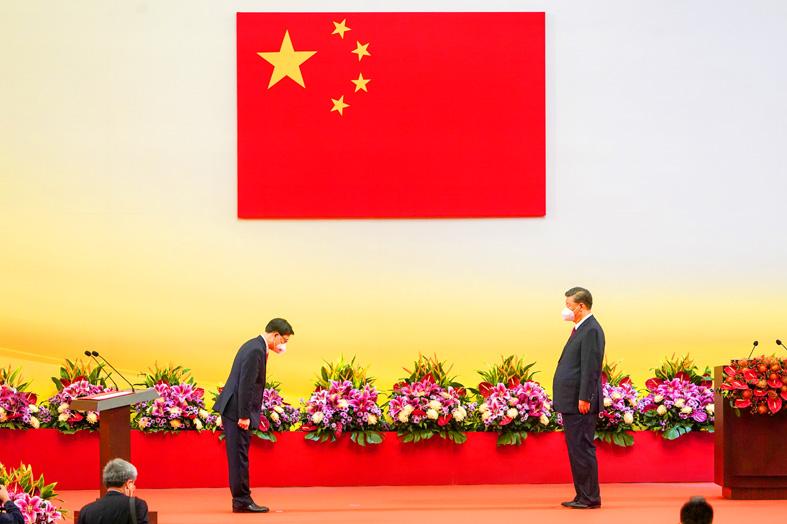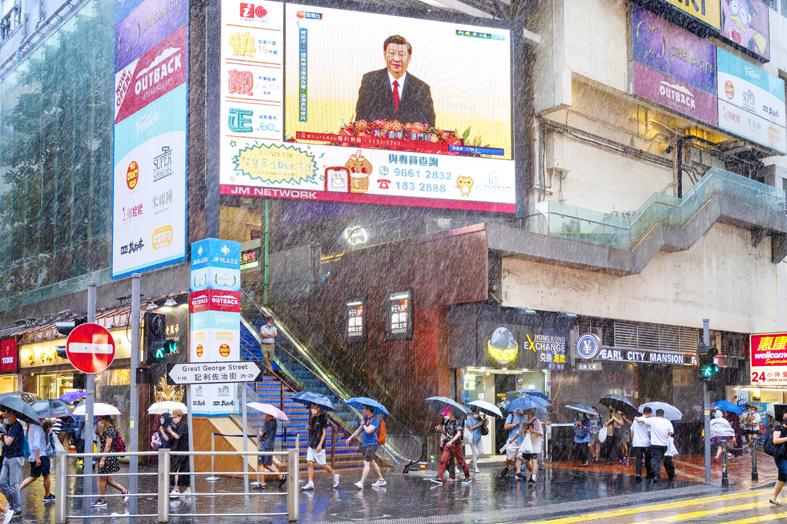There is no reason to change Hong Kong’s “one country, two systems” formula of governance, Chinese President Xi Jinping (習近平) said yesterday on a rare visit to the territory after swearing in its new chief executive, John Lee (李家超).
Britain returned Hong Kong to Chinese rule on July 1, 1997, with Beijing promising wide-ranging autonomy, unfettered individual rights and judicial independence at least until 2047.
China’s critics accuse authorities of trampling on those freedoms, unavailable on the authoritarian mainland, with Hong Kong’s National Security Law imposed by Beijing in 2020 after mass pro-democracy protests the year before.

Photo: EPA-EFE
British Prime Minister Boris Johnson and US Secretary of State Antony Blinken on Thursday said that China had failed to meet its handover commitments.
China and Hong Kong reject the accusations, saying the law “restored order from chaos.”
Xi yesterday said that the “one country, two systems” formula was successful under China’s “comprehensive jurisdiction.”

Photo: EPA-EFE
“For this kind of good system, there is no reason at all to change it. It must be maintained over the long term,” Xi said.
“After experiencing wind and rain, everyone can painfully feel that Hong Kong cannot be chaotic, and must not become chaotic again... Hong Kong’s development cannot be delayed again, and any interference must be eliminated,” he said.
At the swearing-in ceremonies, all officials, including Xi, wore masks and did not shake hands.
Former police officer Lee, sanctioned by Washington over his role in implementing the security legislation, takes charge as the territory is facing an exodus of people and talent amid some of the toughest COVID-19 restrictions in the world.
Authorities deployed a massive security force, blocking roads and the airspace around the picturesque Victoria Harbour, where the last colonial governor, Chris Patten, tearfully handed Hong Kong back to China at a rain-drenched ceremony in 1997.
Red lanterns, Chinese and Hong Kong flags, and posters declaring a “new era” of stability decorated districts across the territory.
Xi did not attend the traditional flag-raising ceremonies yesterday, with media reporting he stayed overnight across the border in Shenzhen after arriving in Hong Kong on Thursday.
Xi’s visit to Hong Kong is his first since 2017, when he swore in outgoing chief executive Carrie Lam (林鄭月娥) and stayed in the territory for the duration of his trip. His overnight whereabouts this time, and the reasons why he might have chosen Shenzhen, have not been officially confirmed.
“It is the end of an era, it is the end of ‘one country, two systems,’” exiled Hong Kong advocate Samuel Chu (朱牧民) said from Oslo, Norway. “This is a city that is no longer recognizable.”

The US government has signed defense cooperation agreements with Japan and the Philippines to boost the deterrence capabilities of countries in the first island chain, a report by the National Security Bureau (NSB) showed. The main countries on the first island chain include the two nations and Taiwan. The bureau is to present the report at a meeting of the legislature’s Foreign Affairs and National Defense Committee tomorrow. The US military has deployed Typhon missile systems to Japan’s Yamaguchi Prefecture and Zambales province in the Philippines during their joint military exercises. It has also installed NMESIS anti-ship systems in Japan’s Okinawa

TRAGEDY STRIKES TAIPEI: The suspect died after falling off a building after he threw smoke grenades into Taipei Main Station and went on a killing spree in Zhongshan A 27-year-old suspect allegedly threw smoke grenades in Taipei Main Station and then proceeded to Zhongshan MRT Station in a random killing spree that resulted in the death of the suspect and two other civilians, and seven injured, including one in critical condition, as of press time last night. The suspect, identified as a man surnamed Chang Wen (張文), allegedly began the attack at Taipei Main Station, the Taipei Fire Department said, adding that it received a report at 5:24pm that smoke grenades had been thrown in the station. One man in his 50s was rushed to hospital after a cardiac arrest

‘WIN-WIN’: The Philippines, and central and eastern European countries are important potential drone cooperation partners, Minister of Foreign Affairs Lin Chia-lung said Minister of Foreign Affairs Lin Chia-lung (林佳龍) in an interview published yesterday confirmed that there are joint ventures between Taiwan and Poland in the drone industry. Lin made the remark in an exclusive interview with the Chinese-language Liberty Times (the Taipei Times’ sister paper). The government-backed Taiwan Excellence Drone International Business Opportunities Alliance and the Polish Chamber of Unmanned Systems on Wednesday last week signed a memorandum of understanding in Poland to develop a “non-China” supply chain for drones and work together on key technologies. Asked if Taiwan prioritized Poland among central and eastern European countries in drone collaboration, Lin

ON ALERT: Taiwan’s partners would issue warnings if China attempted to use Interpol to target Taiwanese, and the global body has mechanisms to prevent it, an official said China has stationed two to four people specializing in Taiwan affairs at its embassies in several democratic countries to monitor and harass Taiwanese, actions that the host nations would not tolerate, National Security Bureau (NSB) Director-General Tsai Ming-yen (蔡明彥) said yesterday. Tsai made the comments at a meeting of the legislature’s Foreign Affairs and National Defense Committee, which asked him and Minister of National Defense Wellington Koo (顧立雄) to report on potential conflicts in the Taiwan Strait and military preparedness. Democratic Progressive Party (DPP) Legislator Michelle Lin (林楚茵) expressed concern that Beijing has posted personnel from China’s Taiwan Affairs Office to its